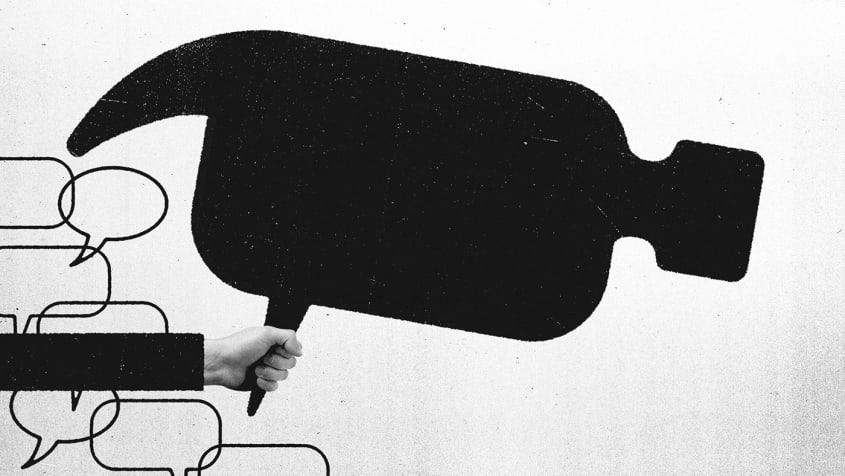How can free speech become the weapon to curtail civil rights?

The Supreme Court ruled in favor of a Christian wedding website designer, Lorie Smith, who refused to provide services for a gay couple, deeming it a violation of free speech to require otherwise. The high court stated that in creating a website for a same-sex couple against her will, the designer would be forced to "disseminate the government's preferred messages in violation of the First Amendment." Essentially, "the state cannot compel her to create a message she does not believe in, even if she offers her talents for hire," The Washington Post summarized.
While there are laws against discrimination based on sexual orientation, the Supreme Court majority viewed the case as a question of whether there was a violation of free speech. In the dissenting opinion, Justice Sonia Sotomayor called the court's decision "a license to discriminate." The court did make the distinction that the ruling applies to "creative professional[s]" whose work is an "expressive design," meaning "they convey a message about her views – and, according to the Supreme Court, that message cannot be controlled by the state," Reuters explained. However, the court did not detail what is considered "expressive design."
This distinction has raised questions as to whether the same logic can be applied to other establishments, as well as whether other groups can be denied service.
What are commentators saying?
The Supreme Court "may have opened a Pandora's box" with this ruling, according to Reuters. Other businesses and service providers may "be emboldened" to argue in a similar fashion that they "cannot be compelled to provide services that can be construed to express approval with viewpoints they oppose." Since the decision isn't clear on what qualifies as "expressive," the ruling "could be expanded in coming years to slowly chip away at nondiscrimination laws that prevent businesses from discriminating against people based on their race, religion, sexual orientation, gender identity, age or any other protected class they might fall into," explained NBC News.
The ruling marks "just the opening chapter in what will likely be years of litigation from people looking to push the limits," per CNN. Along with the freedom of speech and expression, "the First Amendment also includes the freedom of association, which means the right to freely interact with or associate with groups," NBC News continued. Leaning on this freedom may be the first step toward using "First Amendment arguments to establish the right to discriminate," Georgetown University law professor Paul Smith told NBC News.
However, "it would be hard to square a different ruling with previous high court jurisprudence," wrote Megan McArdle in an opinion piece for the Post. The rights of LGBTQ+ Americans are "important" but "we can all agree that the protection of free speech and religious liberty is also an essential purpose." It isn't possible for both sides to be happy. "Religious traditionalists shouldn't be able to stop LGBTQ folks from getting married or accessing public accommodations," but should also not be forced to "express support for something they oppose." In reality, "sometimes securing rights for yourself means respecting someone else's right to be grievously wrong."
What's next?
"The rights of LGBTQ people, including to same-sex marriage, are on more vulnerable legal footing, particularly when they are at odds with claims of religious freedom," wrote The New York Times. "At the same time, the ruling limited the ability of the governments to enforce anti-discrimination laws." Previously, lower courts tended to side with the members of the LGBTQ+ community in cases of denying service, citing the equal protection clause of the 14th Amendment.
"The worry is that this provides a green light to any business owner that they can refuse service to any person on the basis of their identity, whether they're gay or lesbian, or Jewish or Black, or anything," explained Katherine Franke, a professor at Columbia Law School, to CNN. "There was nothing in the opinion that limits it to objections to same-sex marriage."
The Supreme Court already argued the protections of the equal protection clause in its decision to remove affirmative action from the college admissions process. The opinion of the court was that affirmative action programs "employ race in a negative manner, involve racial stereotyping, and lack meaningful end points," thus making the college admission process discriminatory. "The court is just embarking on what may be a multi-year process of trying to figure out how far this will go and how to limit it," Smith commented.
The high court's decision "weakens long-standing laws that protect all Americans against discrimination in public accommodations – including people of color, people with disabilities, people of faith, and women," remarked President Biden following the ruling.
You may also like
Florida construction and agricultural workforces diminished after new immigration law takes effect
Judge limits how Biden officials can communicate with social media companies
How solar and wind energy are saving Texans from a record heatwave

